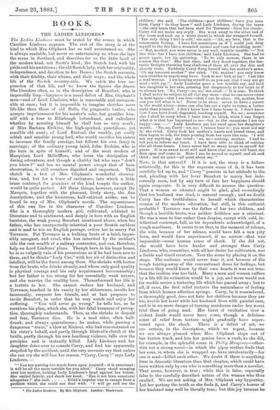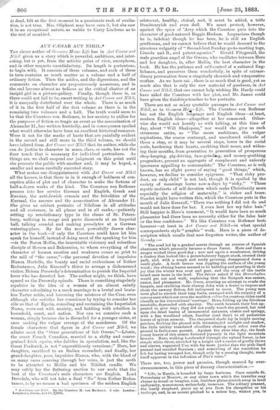BOOKS.
THE LADIES LINDORES
The Ladies Lindores must be tested by the scenes in which Caroline Lindores appears. The rest of the story is of the kind to which Mrs. Oliphant has so well accustomed us. She is always readable, but never so entertaining as when she lays the scene in Scotland, and describes for us the little laird of
the modern kind, not Scott's kind ; the Scotch lord, with his pride and his ambitions ; the old Scotch lady, with her originality, independence, and devotion to her House; the Scotch servants, with their fidelity, their whims, and their ways ; and the whole life of the Scotch country-side. We catch the true im- pression of that life, and we know the figures she draws. She blunders often, as in the description of Beaufort, who is impossibly limp—limpness is a usual defect of Mrs. Oliphant's men—and of Lord Lindores, who is reasonable and unreason- able at once ; but it is impossible to imagine sketches more life-like than those of old Rolls, the pragmatic butler, who accepts imprisonment for his master's sake, but gratifies him- self with a tour to Edinburgh beforehand, and calculates whether by accusing himself he shall lose so very much ; of Miss Barbara Erskine, the high-spirited, punctilious, yet sensible old aunt ; of Lord Rintoul, the weakly, yet coolly selfish and sensible young lord, who would sacrifice his sisters to increase the family prestige, but follows his own fancy in marriage ; of the ordinary young laird, John Erskine, who is the hero in spite of himself; and of the most modern of Marquises, Lord Millefgurs, who loves the dissipation of daring adventure, and though a chubby lad who says " don't you know ?" and has no mental power except that of keen observation, is still somehow dignified and important. That sketch is a test of Mrs. Oliphant's wonderful observa- tion, and, but for a trace of caricature, into which a little inner contempt for grandees of the kind tempts the author, would be quite perfect. All these things, however, except the Marquis, together with the pleasant, lively story, the fine descriptions, and the humorous, half-satirical asides, can be found in any of Mrs. Oliphant's novels. The separateness of this one lies in the character of Caroline Lindores.
She is a thoroughly modern girl, cultivated, addicted to literature and to sentiment, and deeply in love with an English barrister, the weak young Beaufort mentioned above, when her father, who has unexpectedly inherited a poor Scotch earldom and is mad to win an English peerage, orders her to marry Pat Torrance. Pat Torrance is a hulking brute of a laird, impos- sibly arrogant, and cruel, who has inherited by the mother's side the vast wealth of a railway contractor, and can, therefore, help on Lord Lindores' plans. Though born in his huge house, he is as vulgarly vain of his possessions as if he had been new to them, and he thinks "Lady Car," with her air of distinction and intellect, will be the finest among them. She shrinks with horror from the brute, who drinks already, and whose only good quality is physical courage and his only acquirement horsemanship ; but her father is too strong for her essentially weak nature, and she marries the wealthy boor. Thenceforward her life is a torture to her. She cannot endure her husband, and Torrance, touched in his vanity by her abhorrence, insults her incessantly, suspects her friends, and at last proposes to invite Beaufort, in order that he may watch and enjoy her suffering. " You will never go wrong," he tells her, as he mentions his plan, which she, with her fatal keenness of percep- tion, thoroughly understands. Then, as she shrinks in despair and fear, Torrance dies. He is a mad rider, often half- drunk, and always quarrelsome ; he makes, while passing a dangerous "scant.," a blow at Rintoul, who had remonstrated on his sister's behalf, and partly through Rintoul's clutch at the bridle, partly through his own headlong violence, falls over the precipice and is instantly killed. Lady Lindores and her daughter drive over to console Carry, and find her apparently stupified by the accident, until the very servants say that unless she can cry she will lose her reason. " Carry, Carry !" says Lady Lindores, -
"' You are putting too much force upon yourself—it is unnatural; it will be all the more terrible for you after.' Carry stood stooping over her mother, holding Lady Lindores's head against her bosom. She smiled faintly, and shook her head. Has it not been unnatural
altogether ?' she said Edith's impulse was to escape from a problem which she could not deal with. I will go and see the
• The Ladies Lindores. By Mrs. Oliphant. London: Blackwood.
children,' she said. The children—poor children! have you seen them, Carry ? do they know ?' said Lady Lindores, drying the tears — the only tears that had been shed for Torrance—from her cheeks. Carry did not make any reply. She went away to the other end of the room and took up a white shawl in which she wrapped herself. The only thing I feel is cold,' she said.—' Ah, my love, that is the commonest feeling. I have felt sometimes as if I could just drag myself to the fire like a wounded animal and care for nothing more.
— ' But, mother, you were never in any such terrible trouble:—' Not like this—but I have lost children,' said Lady Lindores. She had to pause again, her lip quivering. To be only sorrow, there is no sorrow like that.' She had risen, and they stood together, the fan- tastic firelight throwing long shadows of them all over the dim and ghastly room. Suddenly Carry flung herself into her mother's arms. Oh my innocent mother !' she cried. 06, mother! you only know such troubles as angels may have. Look at me! look at me ! I am like a mad woman. I am keeping myself in, as you say. that I may not go mad —with joy !' Lady Lindores gave a low terrible cry, and held her daughter in her arm, pressing her desperately to her heart as if to silence her. No, Carry—no, no,' she cried.—' It is true. To think I shall never be subject to all that any more—that he can never come in here again—that I am free—that I can be alone. Oh, mother, how can you tell what it is ? Never to be alone : never to have a corner in the world where—some one else has not a right to come, a better right than yourself. I don't know how I have borne it. I don't know how I can have lived, disgusted, loathing myself. No, no ; sometime else I shall be sorry when I have time to think, when I can forget what it is that has happened to me—but in the meantime I am too happy—too —' Lady Lindores put her hand upon her daughter's mouth. No, no, Carry—no, no; I cannot boar it—you must not say it,' she cried. Carry took her mother's hands and kissed them, and then began to sob, the tears pouring from her eyes like rain. I will not say anything,' she cried ; no, no--nothing, mother. I had to tell you to relieve my heart. I have been able to think of nothing else all these hours. I have never had so many hours to myself for years. It is so sweet to sit still and know that no one will burst the door open and come in. Here I can be sacred to myself, and sit and think; and all quiet—all quiet about me.' " Now, is that natural P If it is not, the story is a failure artistically, for this is the supreme scene of it, it has been carefully led up to, and " Carry " persists in her attitude to the end, pleading with her lover Beaufort to marry her inde- corously soon, lest by any turn of fate her happiness should
again evaporate. It is very difficult to answer the question- That a woman so situated might be glad, glad exceedingly that her husband was dead, is natural enough ; and no doubt Carry has the truthfulness to herself which characterises women of the modern education, but still, is this outburst.
probable P Torrance was the father of her two children, and though a horrible brute, was neither faithless nor a criminal. He was a man to fear rather than despise, except with cold, in- tellectual contempt, full, as his dependents acknowledged, of a.
rough manliness. It seems to us that, in the moment of release,.
the wife, because of her release, would have felt a new pity born, and would have experienced, if no sorrow—that was impossible—some human sense of shock. If she did not,.
she would have been harder and stronger than Carry Lindores, who, remember, with all her desire for cultivation, was a feeble and timid creature. Test the scene by placing it on the stage. The audience would never bear it, not because of the rough tearing-away of the conventional dress for feelings, but because they would know by their own hearts it was not true,. that the realism was too bald. Many a man and woman suffers: by a life till its extinction would be 'a joy, and more would not for worlds revive a torturing life which has passed away ; but to all, if sane, the first relief restores the naturalness of feeling from which human affection springs. Carry, be it remembered,. is thoroughly good, does not hate her children because they are his, avoids her lover while her husband lives with painful care,.
and is in no more danger of turning murderess under her worst trial than of going mad. Her burst of exultation over a violent death would never have come, though a delicious sense of relief from torture might gradually have super- vened upon the shock. There is a defect of art, we are certain, in the description, which we regret, because we are always pleased when Mrs. Oliphant steps out of her beaten track, and lets her genius have a rush, as she did,
for example, in the splendid scene in Philip Musgrave—other- wise not a strong novel—in which the gipsy mother finds that
her sons, in whom she is wrapped up, have involuntarily—for one is mad—killed each other. We doubt if there is anything finer in dramatic literature than that chapter, which could have been written only by one who is something more than a novelist. That scene, however, is true ; while this is false, especially- false to the carefully described nature of the woman who thus exulted. We are not asking of Mrs. Oliphant any hypocrisy.
Let her portray the truth as she finds it, and Carry's horror of her husband may well be literally true; but this joy because he is dead, felt at the first moment in a passionate rush of exulta- tion, is not true. Mrs. Oliphant may have seen it, but she saw it in an exceptional nature, as unlike to Carry Lindores as to the rest of mankind.



































 Previous page
Previous page